By Nancy Novick
In the summer of 1977, New York City was about as far from the tourist mecca it is today as can be imagined. The Bronx was burning, a serial killer was targeting young women with brown hair, and the city’s recovery from near-bankruptcy was continuing at an excruciatingly slow pace.
And then came the blackout of July 13. The chaos of the blackout—caused by a lightning strike on a Con Edison transmission cable—and its aftermath of looting, fires and violence made international headlines describing a major metropolis in crisis. But on a local scale, smaller, more personal stories were unfolding. In her new book, We Are Staying: Eighty Years in the Life of a Family, a Store, and a Neighborhood, Jen Rubin documents her family’s commitment to the Upper West Side before and after the blackout and the challenges of running a small business over more than seven decades.
Leon Rubin, the author’s grandfather, founded Radio Clinic in 1934 on Broadway and 98th Street. Operating first as a radio repair shop, Radio Clinic (later known as RCI) became a supplier of all manner of appliances, including televisions, boom boxes, and air conditioners to generations of New Yorkers. After changing hands in 2007, the store remained open until 2014. (A second branch of Radio Clinic opened in the mid-1940s on 83rd and Broadway until 1995.)
Over the course of Radio Clinic’s existence, the Rubin family watched as the Upper West Side evolved from an affordable neighborhood where ambitious immigrants could open a business with one month’s rent and a signed guarantee of continued payments, to a community plagued with violence and crime in the late 70s and early 80s. Further transformation took place beginning in the mid-80s, with an influx of young, affluent New Yorkers who were ready to pay for increasingly costly apartments and to patronize newer, more expensive stores, a change that sometimes put landlords and newcomers at odds with the area’s longtime residents. We are Staying also chronicles how these developments affected numerous mom-and-pop stores, from the soda shops and furriers that were Radio Clinic’s early neighbors to the mom-and-pops displaced more recently by banks and drugstores.
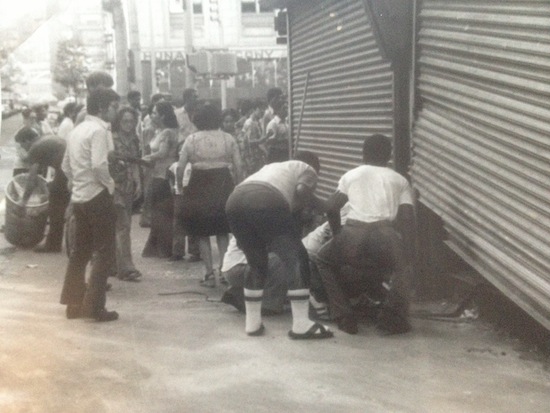
Photo outside Radio Clinic during the blackout by Alan Rubin, the author’s father.
During that low period in which the blackout occurred, many residents and business owners left the neighborhood for safer, more prosperous pastures. But Radio Clinic remained, and on July 14, 1977, Ms. Rubin’s father, Alan Rubin, hung a reassuring sign in the window that read “We Are Staying.” Although the main floor of the store had been looted the previous night, the inability of looters to use the store’s elevator and difficult egress from the basement warehouse meant that much of their inventory was spared. Once the power came back on—close to 24 hours later—the store was even able to sell their stockpile of air conditioners, an item that was for many years their “bread and butter.” Remaining open during the years that followed was satisfying, but also frequently challenging and eventually required Mr. Rubin to make periodic infusions of capital from his personal finances.
Although neither Ms. Rubin nor her brother chose to continue in the family business, they remained committed to helping their father with financial advice and moral support. (One of Ms. Rubin’s early jobs involved playing Atari video games in the store window.) And as her book makes clear, she continues to share her “dad’s belief in the virtue of small businesses and the immorality of any institution that harmed them.” Not surprisingly, Ms. Rubin’s later work would include becoming active “in the fight to build permanently affordable low-income housing” in Michigan.
For students of New York City and UWS history, We Are Staying, provides an interesting, and sometimes moving, account of the satisfactions and challenges of maintaining a small business. While some details of managing an appliance store and dealing with the city’s bureaucracy may not be of interest to every reader, the underlying story of survival in a setting where many others failed, makes for compelling reading. Ms. Rubin is a fine and careful writer, who also teaches storytelling workshops and co-produces the Moth StorySlam in her hometown of Madison, Wisconsin. In addition to including a list of resources used in composing the book, she provides the playlists of music she listened to while working.
On October 15 Ms. Rubin will discuss We Are Staying with New York Times journalist and UWS resident, Amy Harmon, at LandMark West. More details are available at this link. https://landmarkwest.ticketspice.com/we-are-staying
Postscript: Alan Rubin sold the 98th street location of Radio Clinic in 2007 after the “rising expense of doing business on the Upper West Side far outpaced the rate at which [he] could grow the business, no matter how many good ideas he had.” When the 98th street store closed, owner Khushboo Dhanani let the West Side Rag know that it was not due to a landlord’s greed, but rather because “Business is not what it used to be and expenses are increasing on all sides.” At last report Mr. Dhanani was planning to move RCI to Queens. For many local residents, Radio Clinic’s reputation remained intact, even after the Rubin family no longer ran the business. When the news of the store’s closing was reported in West Side Rag, many readers expressed their sorrow. These responses are included in Jen Rubin’s book and may also be viewed here.
We Are Staying (Carb House, 2018) is available on indiebound.org, Amazon.com, and BN.com.
West Side Rag previously published an account by Rubin of the blackout here.
Nancy Novick is a professional writer and writing instructor with more than 20 years of experience preparing content for professional and consumer audiences. She recently published her first short story, “How Does he Die this Time?” in the September/October issue of Ellery Queen Mystery Magazine. A podcast of the story can be heard here.
Nancy can be reached at nbnovick@gmail.com.



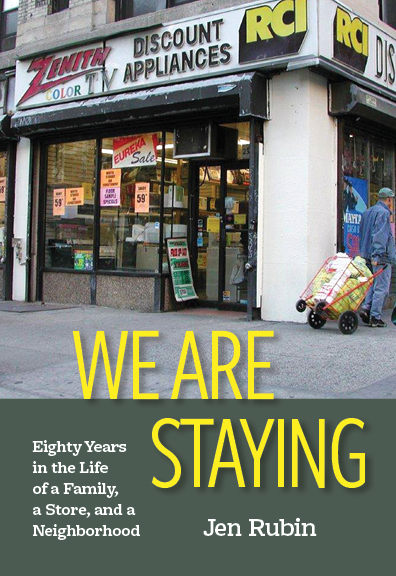

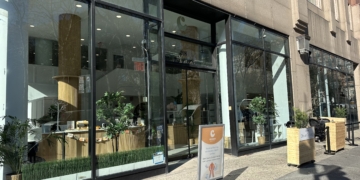

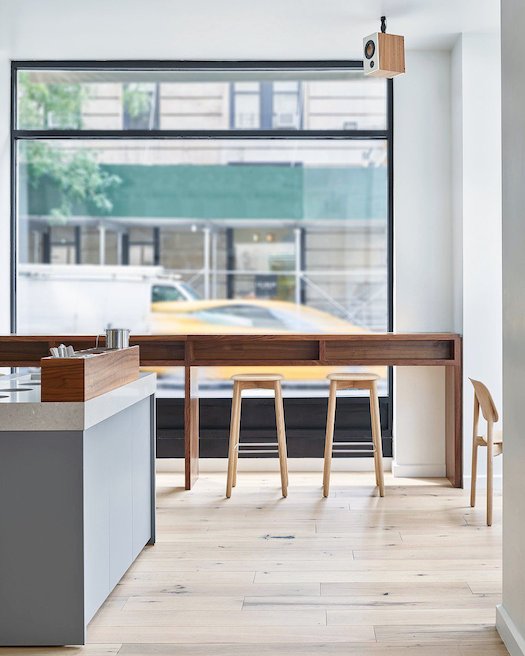

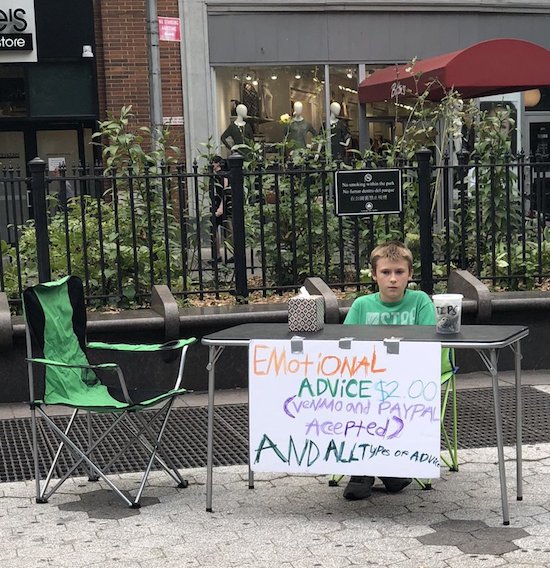
I moved into The Paris, 97th and WEA, in the summer of 1978 and went to RCI for an air conditioner. I met Al Rubin and a sales guy who I think was called Hans.
Al knew that The Paris was reopening that summer after a total gut renovation, with 179 new apartments. Al offered me a deal (unasked): If I referred new tenants to RCI and they bought, Al would take $100 off for each successful sale.
I told everyone I met that I bought an A/C locally; that RCI delivered and installed the unit about which they advised me of the BTUs needed based on my studio apartment’s dimensions.
I recall one such success and Al did, indeed, give me a cash rebate for it. He kept tabs on what was happening in our local area and I remained a customer for many years.
Many thanks to Al Rubin and RCI for being an anchor in our neighborhood.
A taste of Old UWS https://www.youtube.com/watch?v=jnH6e7mP33w
RCI was my go-to store for appliances when I moved to West 83rd Street in 1973. I was happy to follow them up to 97th Street when they moved and was so sad when they closed that store. RCI was the epitome of a true neighborhood store. No chain or big box store will ever be able to replace them.
Old UWS: https://www.youtube.com/watch?v=jnH6e7mP33w
And now that storefront has been vacant for well over two years.